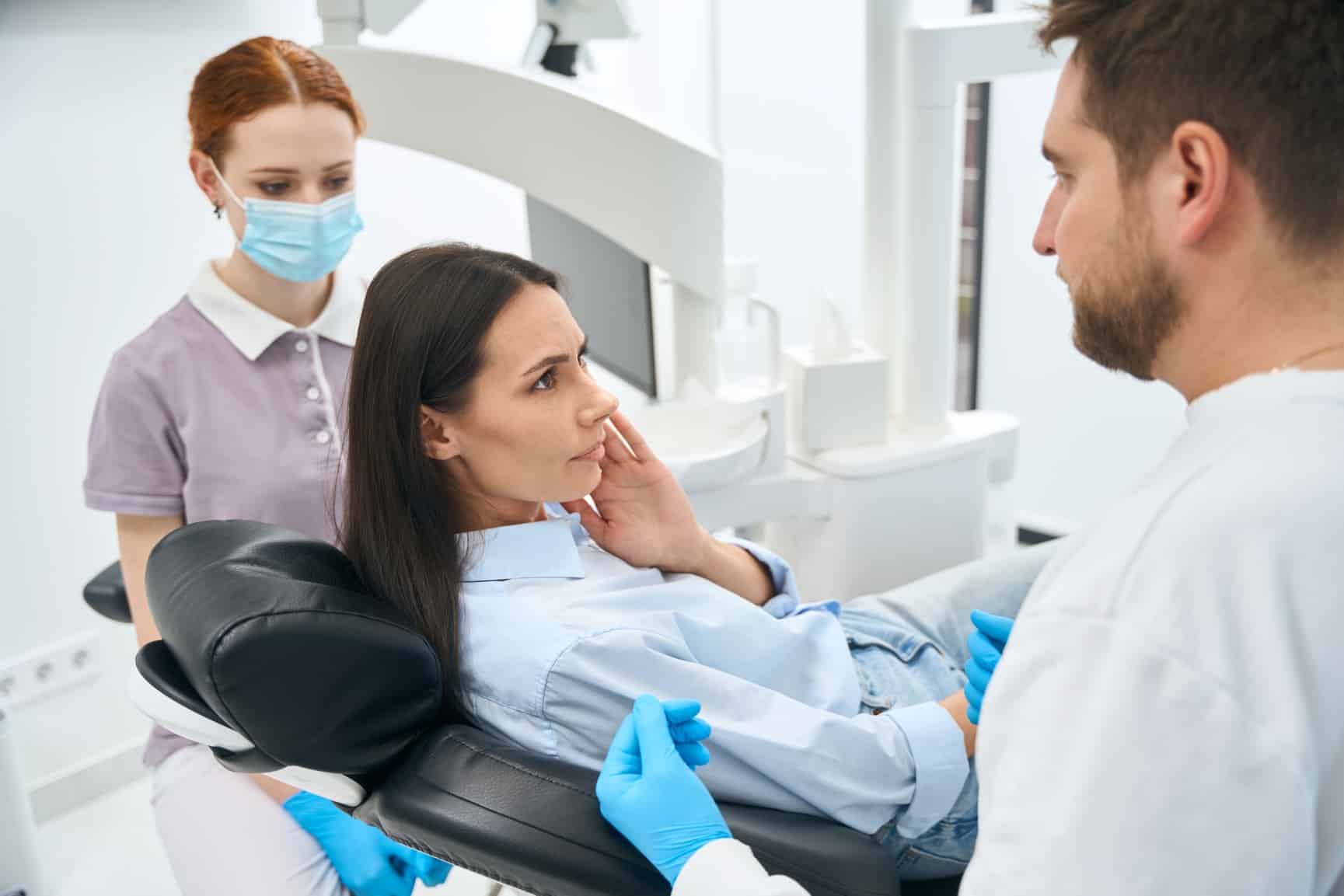Through time, our bodies deteriorate with our age. This fact means that our bones, organs, and teeth also age with us. Based on the report of the American Dental Association, about 20% of the seniors in the United States will wear dentures for aesthetics and practical purposes by 2030. (1)
Researchers studying senior health realized that general oral health problems in the primary cause of weight loss for over a year. They correlated poor dental health with involuntary weight loss. Other factors that lead to such outcomes include age, nutrition, and household status. Seniors should take special care of their teeth in addition to eating right and exercising to avoid malnutrition and other health risks associated with it. (2)
Possible Dangers of Sudden Weight Loss Among Seniors
Negative health effects of sudden, unexpected weight loss in the elderly include:
- Enhanced Tiredness
- Loss of independence in caring for oneself, including the inability to bathe, groom, or dress
- Increased possibility of injury due to falling
- Impairment of the immune system’s ability to fight infection
- Shifts in mental illness
- A higher probability of infection
- Loss of autonomy, necessitating either temporary or permanent placement in an institutional setting such as a nursing home or assisted living facility
Common Dental Health Problems Experienced By Seniors
If you’re wondering what are the common dental health problems experienced by seniors, this section will explain everything you need to know about this topic. Here are the oral health problems you should take note of for the seniors around you.
Dry mouth
Aging does not necessarily bring about dry mouth, just as it does not naturally bring about falls or cognitive deterioration. Problems with chewing, swallowing, and even speaking can arise from dry mouth, which occurs when there is not enough saliva to keep the mouth wet. The lack of saliva might make it harder to fight off bacteria in the mouth, which can lead to an increase in the likelihood of tooth decay. And many medications themselves can lead to a dry mouth.
Other causes of dry mouth:
- Head and neck injuries
- Medications might cause unwanted side effects. Treating diseases such as depression, anxiety, pain, high cholesterol, and high blood pressure often involves the administration of dozens of different drugs, many of which have the side effect of dry mouth.
- Chemotherapy or radiation therapy
Deterioration of the root and infected gums
This happens when decay-causing acids reach the tooth root. As gum tissue recedes, the tooth roots are seen. Since they lack enamel protection, teeth’s roots are more susceptible to decay than the tooth’s visible crown.
Infected gums and supporting tissues can lead to tooth loss. When plaque forms in the crevices between teeth and along the gumline, gum disease develops. Better oral hygiene can reverse mild gum disease. Gum disease can be avoided or detected in its early stages by daily brushing and flossing and routine dental checkups.
Tooth loss leading to an uneven jawbone
Problems arise when people lose teeth and don’t get dentures. This loss frees up space for the remaining teeth to move and shift, which creates irregularities or an uneven jawbone.
Oral sores
After the age of 55, your risk of developing mouth cancer rises significantly. The National Institute of Dental and Craniofacial Research reports that discomfort is not an early sign of the condition, therefore it is crucial to keep an eye out for any changes in your mouth.
Lack of sense of taste
Age is a major factor in the decline of taste, but other factors such as sickness, medication, and dentures can all play a role as well.
Darkened teeth
Changes in the dentin (the bone-like substance beneath the tooth enamel) and a lifetime of ingesting stain-causing foods and beverages contribute to this. Similarly, this is due to a reduction in enamel thickness, which allows the dentin beneath to become more visible and darker. Tooth discoloration can be a warning indication of more serious dental issues, so it’s important to see your dentist if you notice any changes.
Weight loss in the elderly can be caused by a number of different factors and not just by poor oral health. It can also be caused by medication side effects, emotional issues, inability to feed oneself, and lack of access to food.
The happiness and contentment that our elders should feel in their golden years can be diminished by any of these factors. To mitigate this risk, seniors should prioritize their oral health, even if addressing the underlying causes may be more difficult. That’s why getting an accurate diagnosis is essential for preventing further risks.
Other Reasons Why Seniors Lose Weight Unexpectedly Besides Oral Health Issues
Aging
It’s also possible that these changes are the result of normal, age-related bodily processes. Typical aging processes include a decrease in muscle mass, weakening of bones, and a shrinking of the liver and kidneys. Tissue breakdown also causes a drop in total body water. A noticeable but medically insignificant loss of weight could result from all of these factors.
Mental problems
Unintentional weight loss is common among those who suffer from mental health problems such depression, bipolar disorder, personality disorder, anxiety disorder, and substance misuse or alcoholism. The person may forget to eat, or they may eat things that aren’t beneficial for them, both of which could be signs of Alzheimer’s disease or dementia.
Stagnant lifestyle
Inability to do activities of daily living (ADLs) or having a stagnant lifestyle might lead to rapid weight loss. The inability to drive may necessitate other means of transportation for senior people, such as walking or utilizing public transportation to the supermarket. This may need more frequent trips to the grocery store, which can lead to a depleted pantry and an unhealthy reduction in the number of meals available.
Isolation from others
Many events, including parties, family gatherings, and community gatherings, had to be canceled because of public health precautions taken in reaction to the pandemic. This has the potential to increase the isolation of seniors, particularly those who live alone. It is possible that feelings of loneliness brought on by being alone could lead to a loss of appetite or a lack of motivation to cook and eat healthy meals.
Adverse effects of medication
Some drugs have the unwanted consequence of reducing appetite, which can lead to weight loss in the elderly. Changes in taste or smell, dry mouth, nausea, and vomiting are all possible negative reactions. Polypharmacy, the use of numerous drugs, has been linked to anorexia in some cases.
Chronic medical illnesses
Seniors may lose weight due to underlying chronic conditions such as cancer, Parkinson’s disease, hyperthyroidism, heart disease, uncontrolled diabetes, or gastrointestinal difficulties. Appetite, eating habits, and the management of body weight can all be affected in various ways by any of these diseases.
Tips to Prevent Weight Loss Among Seniors with Oral Health Problems
In spite of the fact that some populations may require additional care for their oral health, it is important for everyone to take care of their teeth and gums. To help maintain healthy teeth and gums for your senior friend, consider the following tips:
Keep your mouth hydrated
Dry mouth is a common side effect of many medications, so seniors who are concerned about their breath can talk to their doctor about switching to a different medicine. In addition to that, you should consider supplementing your diet with sugar-free gum and drinking enough water. Because alcohol is a known dehydrator and carcinogen, cutting back or eliminating your consumption is a good idea.
Follow a good oral routine
Natural teeth must be cared for by brushing and flossing twice a day at a minimum if they are to remain in good oral health. Plaque can easily accumulate on elderly people’s teeth, leading to cavities and gum disease if proper oral hygiene is not practiced.
It is also important for seniors to remove plaque and prevent periodontal disease by brushing and flossing their teeth at least twice daily. Follow a good oral routine and it will help seniors maintain their oral hygiene.
Fun fact: fluoride toothpaste and fluoride rinses should be used regularly to prevent tooth decay.
Follow this routine for a better oral health:
- Make sure you use fluoride toothpaste and brush your teeth twice a day.
- Regular flossing is essential.
- Use an antibacterial mouthwash once or twice daily.
- Be sure to arrange biannual visits to the dentist for cleanings and checkups.
Note: The American Dental Association expresses that using an antibacterial mouth rinse can help reduce the germs in your mouth that contribute to plaque and gum disease.
Prevent food or drinks that stains teeth easily
Take note that alcoholic favorite red wine, carbonated drinks like soda, caffeinated beverages such as tea and coffee, and sweets are some examples of food and drinks you should avoid. On the other hand, eating cheese will make your mouth produce more saliva, which will help keep your mouth moist. Yogurt, apples, leafy greens, and celery are also great options for the elderly as they contribute to good teeth hygiene.
When Do Seniors Need to Visit a Dentist
The general rule of thumb for visits to the dentist’s office for seniors is twice a year. Biannual cleanings and examinations are important for maintaining oral hygiene and protecting against a wide range of dental diseases, even if you’ve been diligent about brushing and eating well.
The American Dental Association (ADA) asserts that individual differences in diet, hygiene practices, and other factors ultimately determine one’s oral health in old age. Depending on the individual, you may need to pay more or less attention to certain teeth.
It’s not a problem with a simple answer. It’s crucial that you and your dentist talk about your dental concerns and come up with a treatment plan that works for you. Your doctor’s recommendation for how often you should visit will be based on your age, health history, and other considerations.
Regular check-ups
It is important to have your teeth and gums examined every six months to check for concerns like cavities and gum disease. Regular checkups with your dentist can help you spot problems early on, before they develop into major ones. Seniors, in particular, should maintain a regular dental hygiene routine to avoid the development of serious, permanent health issues.
Additional oral care
In addition to the regular checkups and cleanings that seniors should have, there may be additional instances when they need to see the dentist. For example, rapid dental attention is required if you have unexpected pain, especially if it is associated with chewing, such as extreme sensitivity. In a similar vein, it’s crucial to see a doctor right away if you notice any indicators of oral health issues including bleeding gums, tooth loss, an abnormally dry mouth, or ulcers.
Takeaway
No matter if you have a full set of natural teeth or a full set of dentures, it’s important to keep up with regular dental checkups. The health of your mouth and teeth can be preserved with routine professional care, and your dentures’ fit can be monitored by your dentist.
If you want to avoid losing weight without trying, take care of your teeth and gums by following these simple steps. Taking care of your teeth as you age can improve your overall health and quality of life.
References:
- agingstats
- pubmed
- phenterminedoctors
- harvard








